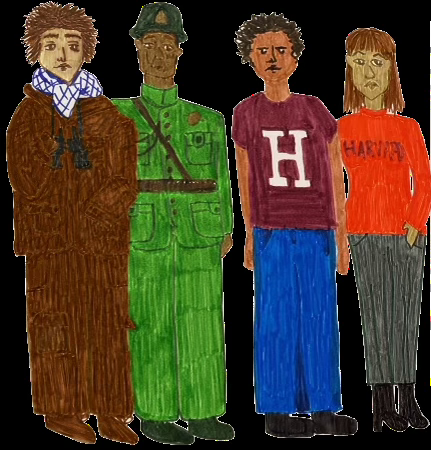Harvard students are no strangers to challenge, but military rigor is unlike the usual academic, social, and physical tests required for admission to the college. Three percent of Harvard’s student body either served in the military prior to attendance or enrolled as part of the Reserve Officer Training Corps (ROTC) program. Yet the experiences of these students are often overlooked, despite the talent they contribute to Harvard’s student body.
For Sean Zehnder ’25, military service is mandatory for all men in his home country of Switzerland. Zehnder took a year to fulfill his national duties upon receiving an offer from Harvard. He explains that many people (about fifty percent) find ways out of the military requirement, but that he wanted to serve, even as a teenager. “There’s this whole process that you start when you’re sixteen or seventeen. They show you all the troops. Then, there’s physical and intelligence tests,” Zehnder says.
Zehnder’s path through the military was far from easy. Not only did he join with less preparation than most troops, but he joined one of the most intense military cohorts available to him. He elaborates: “I only turned eighteen after I graduated, and you have to be eighteen to go to Draft Day. So I had to rush that process. Therefore, I was very late. Usually, your draft date is at least one year before you would actually go, but for me it was three months, so there were no spots for me in most groups. The only spots that were left were the Special Forces,” which Zehnder explains are the equivalent of the Marine Corps in the United States.
American students have also felt this compulsion to serve their country. Emilie Kalkus ’25 explains why she dedicated her young adulthood to serve the U.S.: “I’m from a military family. It’s just kind of expected that that’s what you do. I can’t really explain it. Every single generation since the American Revolution in my family has had someone in the United States Army, and my siblings weren’t gonna do it, so it’s me.”
The ROTC program trains students through a variety of physical and intellectual courses. The program consists of physical training three times per week, a military history class in the spring, a fundamentals of the Army course in the fall, and training at MIT on military basics, such as tactical combat and calling airstrikes. Following the program, students typically serve four years of active duty. Some join the U.S. forces long-term.
Nick Ige ’25 chose this latter path. After completing the ROTC program, Ige joined the Army as an infantryman in 2011. He says that “the job description is to get close with, engage with, and destroy the enemy.” Upon graduating from infantry school, he went to airborne school before becoming a more elite infantryman. “I deployed with them and was sent to my first unit which was called the 82nd airborne,” one of the more famous units within the U.S. Army, he says.
Ige’s journey challenged him physically and mentally. As part of a special forces team for nine months, he explains: “We didn’t have running water. We didn’t have electricity. We basically just camped for nine months and did active patrols and defended our base in case we got attacked. I was in the conventional army for another three years, infantryman to a sniper reconnaissance team leader.” To top off his career, Ige competed in a best ranger competition, which he describes as an “iron maiden but for the Army.”
But even at the end of his time in the world’s premier direct action raid force, Ige knew he needed a change.
“I had a lack of empathy,” he says. “I realized that I was getting extremely comfortable with violence.” As a result, Ige decided to pause his service and attend college. At Harvard, he studies among not only international veterans like Zehnder and budding officers like Kalkus, but also a plethora of students with no military experience and no understanding of the life-or-death challenges he once faced.
Now, Ige wonders whether he will return to the military after school. “I’m trying to figure out if I miss the familiarity of it all,” he says, “or if I want to push on and change something new?”
Mary Cipperman ’25 (mcipperman@college.harvard.edu) ran a 5k a couple of times and hates scary movies.

